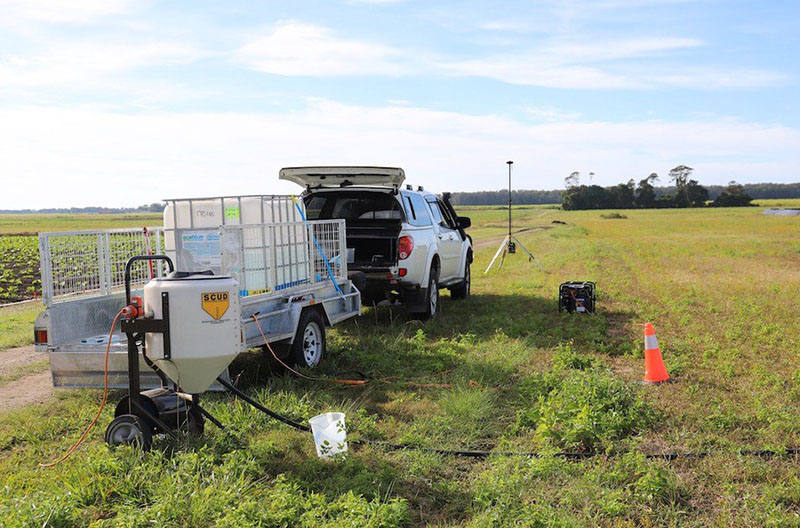Rotational Molding is Widely applied to Produce Parts and Products for Agriculture
 Sep 07,2022
Sep 07,2022

Rotational Molding is Widely applied to Produce Parts and Products for Agriculture
Rotational molding is process with a lot of strengths and possibilities, such as low tooling cost, design flexibility, intricate geometric shape, complex contours, one-piece construction, precise size control, easy to mold-in inserts, lightweight, high-quality product, and plus more. Therefore, this process is now widely applied in the production of a variety of parts products used in the agriculture and farming industry.

How does rotational molding work?
Rotational molding has key four stages. Firstly, a quality mold is placed on an arm of a rotating molding machine that has a loading and unloading area, a heating oven and a cooling station. Several molds can be placed on the machine at the same time. A pre-measured amount of plastic powder is loaded into each mold. The molds are then moved to the oven where they are slowly rotated on both the vertical and horizontal axis. As heat penetrates the mold, the resin melts and adheres to the mold's inner surface until it is completely fused. No pressure is involved in the process. The simultaneous heating and rotation evenly distribute the material on the inner surface of the mold, maintaining a uniform wall thickness. The third stage is cooling. The molds are then cooled by air or water spray or a combination of both while still rotating. This gradually lowers the temperature. The last stage is demolding. Once the parts are cooled, the finished parts are removed and the molds are ready for the next cycle.
What types of parts for agriculture and farming are made by rotational molding?
1. Agricultural equipment
Being rugged and durable to withstand the exposure to the extreme climate condition and chemicals, rotomolded plastic parts are now taking place of the metal parts for the agricultural equipment such as tractors, smart robotic mowers, seed hoppers, and threshing machines.
Examples
- Panels
- Dump boxes
- Cab roofs
- Dashboards
- Consoles
- Machine cowling
- Mudguards
- Tractor fenders
2. Agriculture tanks for different purpose
Rotational molding is ideal for making hollow articles with one-piece construction. Therefore they don’t have welded joints, and rotational molding process leaves both the interior and the exterior of the water tanks smooth and leakage-free. This makes them stronger and better able to withstand any type of impact or vibration during use. The primarily used in rotational molding is recyclable polyethylene. This material has excellent UV resistance and is perfect for use both indoors and outdoors. Polyethylene can be even tailored to meet specific requirement, such FDA.
Examples of agriculture tank
- Water tank
- Hydraulic tanks
- Seeder tanks
- Machine reservoirs
- Coolant tanks
- Fuel tanks
- Diesel tanks
- Drone water tank
- Fertilizer tank
- Food tank
- Milk tanks
- Spray tank
- Cartage tank
3. Farming plastic product
Rotational molding is a highly useful process to provide farmers with the robust and durable products such as the drinking trough, sink, cattle feeders. Livestock are inevitably crowded and trampled when drinking water. The water tank product needs not only a certain strength to withstand the trampling of cattle, but also sufficient toughness to ensure that it does not crack and leak. Unlike wood or metal, they don’t rust, they’re not edible, and they’re almost immune to insect infestation
4.Aquaculture
Rotational molding is adapted to produce plastic products for aquaculture such as the fish farm cage, buoy, feed hoppers and more, as the seamless construction makes them more durable and resistant to knocks and bumps
Light Venus is a trusted custom rotational molding manufacturer to some of the branded companies, OEMs in the agricultural field, we can produce custom designed parts and component. Email us to roto@lightvenus.com if you have a project in mind. At Light Venus, our team has the skills, expertise and experience to give your guidance through the entire production process.
 Tel: 0086-13632687993
Tel: 0086-13632687993  Email: roto@lightvenus.com
Email: roto@lightvenus.com

 Home
Home Why Rotational Molding Produces Premium Quality Plastic Toolbox?
Why Rotational Molding Produces Premium Quality Plastic Toolbox?  You May Also Like
You May Also Like



 Tel
Tel
 Email
Email
 Address
Address








